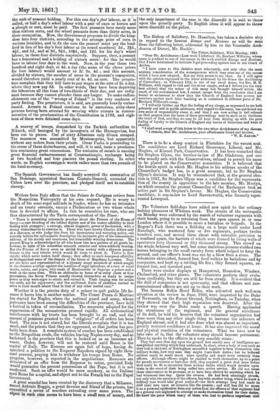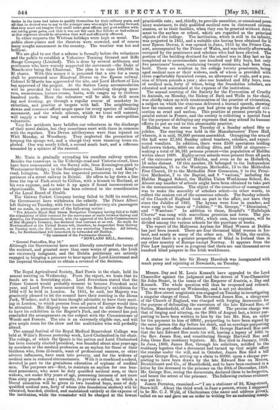The Volunteer field-days have added new spirit to the ordinary
holiday pleasures of Whitson week. The streets of the metropolis The Volunteer field-days have added new spirit to the ordinary holiday pleasures of Whitson week. The streets of the metropolis on Monday were enlivened by the march of volunteer regiments with their bands, going to or returning from the open spaces in or near London where it is possible to move a battalion or brigade. In the Regent's Park there was a field-day on a large scale under Lord Ranelagh, who mustered four or five regiments, perhaps twelve hundred men, and moved them about with tolerable precision in a confined space, the barriers of which were formed by living walls of spectators forty thousand or fifty thousand strong. This crowd on the whole behaved very well, but some malicious persons stabbed two horses belonging to the small cavalry force which helped to keep the ground, and one officer's head was cut by a blow from a stone. The volunteers skirmished, formed line, fired volleys by battalions and by companies, and kept up a rattling file fire ; they formed squares, re- formed line, and marched past.
There were similar displays at Hampstead, Hounslow, Windsor, Chelmsford, and other places. The volunteersperform their evolu-
tions creditably, but they are still far from steady. It is evident that the drill of companies is not systematic, and that officers and non- commissioned officers are not up to their work.
The famous Robin Hood Rifles, who attracted such well-won attention at the review in June, 1860, were inspected by the Duke of Newcastle, on the Forest Ground, Nottingham, on Tuesday, when they showed that their high reputation was deserved. After the review was over the Duke made a speech. Having applauded the steadiness of the regiment, and the general excellence of its drill, he told his hearers that the volunteer organization had done more than any other single thing to increase the influence of England abroad, and it had also done what was almost as important, greatly restored confidence at home. It has also improved the moral and physical condition of the volunteers. What we have now to take care of is, that the volunteer army should become permanent. Then he spoke to the officers in a very sensible strain :
They had seen that day upon the ground how readily men of intelligence se. comphshed anything which they undertook. In short, when a body of men such as they had in the town of Nottingham assembled together to form themselves into military bodies, how very soon they might learn their duties; but he believed soldiers could be made much more speedily and much more certainly than officers. Although officers might be enabled to work themselves up to a point for parade movements or battalion drill, they required a great deal more before they could be fit to encounter those serious duties which would devolve upon them in the event of their being called into active service. He did not mean these observations to be personal, or to have been elicited by anything which he had witnessed that day. Quite the reverse. He had been amazingly struck, not only with the accuracy of the officers, but with another thing, which he knew a military man would take great notice of—the little attempt they had made to I drill their men upon an occasion like the present; and still less did he mean it as a personal application from any notion that the officers of that regiment had
as a general rule neglected to attempt to make themselves fitted for their duties. Heknew the pains which many of those who had to perform important civil
duties in the town had taken to qualify themselves for their military posts, and all that he desired was to say to the younger ones who might be coming forward, that they must not imagine they could make good officers and good soldiers with- out taking great pains, and that it was not fair such fine fellows as had enlisted in that regiment should be otherwise than well and efficiently officered.
• In other respects the Whitsun holidays were kept as usual. The public show-places and the theatres were crowded, and of course many sought amusement in the country. The weather was hot and
brilliant.
We are glad to see that a scheme is formally before the volunteers and the public to establish a Volunteer Training Ground and Rifle Range Company (Limited). This is done by several noblemen and gentlemen who have warmly supported the movement—the Duke of Manchester being the Chairman. The plan is to raise 100,0001. in 21. shares. With this money it is proposed that a site for a camp shall be purchased near Baustead Downs on the Epsom railway. Colonel hillurdo has approved of the site, and Lord Herbert of Lea has approved of the project. At the Sutton Camp accommodation will be provided for two thousand men, including sleeping quar- ters, mess-rooms, lecture-rooms, butts, with ranges up to thirteen hundred yards. Here the volunteer will be able to drill morn ing and evening, go through a regular course of musketry in- struction, and practise at targets with ball. The neighbouring downs and commons afford ample space for every species of military movement, and the whole scheme, which we trust will succeed, will supply a want long and seriously felt by the metropolitan volunteers.
Very few accidents have befallen our volunteers in the discharge of their novel duties, but they sometimes meet with them in common with the regulars. Two Devon artillerymen were thus injured on Whit Monday, at Woodbury. They neglected the precaution of keeping the sponge wet, and a charge they were ramming home ex- ploded. One was nearly killed, a second much hurt, and a rifleman wounded by a splinter of the ramrod.































 Previous page
Previous page